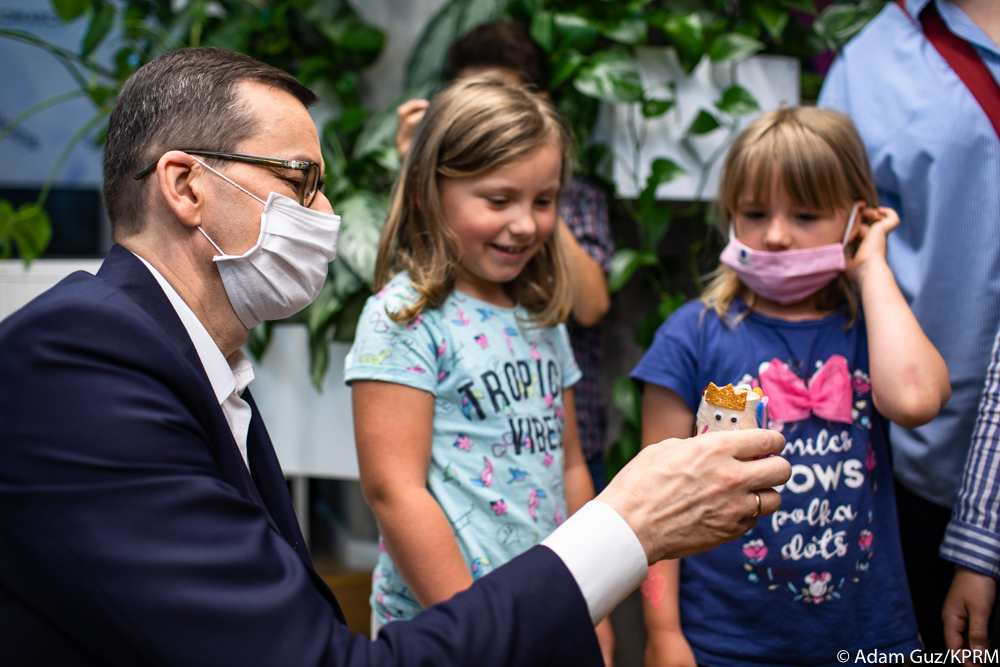Young people in Poland today are bombarded with a consumer approach to life that encourages them to concentrate on building a career and becoming self-reliant at the expense of traditional family values, warns a government minister.
The ministry for family and social policy hopes that it can show them that there is “an alternative” through a new programme promoting the benefits of starting a family earlier and having many children.
“Family is the highest value, the best place for raising children, the best way of building a better future for the next generations. It is not worth endlessly putting off the decision to start a family or increase its size,” says the head of the ministry, Marlena Maląg.
💬"Wspieranie rodzin to nasz absolutny priorytet" – mówiła na spotkaniu z przedstawicielami organizacji pozarządowych minister @MarlenaMalag. #Rodzina #PoPierwszeRodzina
ℹ️ https://t.co/jH3wi4KFPZ pic.twitter.com/m9pCnSFois
— Ministerstwo Rodziny i Polityki Społecznej (@MRiPS_GOV_PL) November 23, 2020
Maląg’s deputy, Barbara Socha, in an interview with the Polish Press Agency (PAP), discussed the recipients of funding from this year’s inaugural edition of the “Family First!” programme, which provides grants for educational and training projects promoting families.
These included an institute promoting the teaching of Polish Pope John Paul II; a Catholic foundation working with young people; and a women’s association promoting a “natural understanding” of femininity, the family and respect for human life.
Also successful were a foundation promoting public health and sport among young people and another that uses hip-hop music in schools to promote Christian values.
Young people are “bombarded with a consumer approach to life channelled exclusively towards building a professional career and self-reliance,” Socha said. “From my experience I can say that many people who have approached life in this way later regret that they did not encounter an alternative.”
In total, 38 organisations have benefited from this year’s programme, receiving funding amounting to 8.6 million zloty (€1.9 million).
Other projects funded include a series of educational and lifestyle films aiming to popularise a positive image of the family unit, as well as a school offering legal, psychological and pedagogical advice to married couples planning to start a family. “Another very innovative idea is building local family media,” said Socha.
The national-conservative Law and Justice (PiS) party came to power in 2015 with promises to place great emphasis on family policy and “traditional” values.
Its flagship social policy has been the “500 plus” programme that gives generous monthly payments to parents for each of their children. Last year, the government introduced “Mama 4 plus”, which guarantees minimum state pensions to mothers who have raised four or more children.
The newly appointed education minister, Przemysław Czarnek, last year warned of the dangers of telling women that they can have “a career first, and maybe a child later”. “Saying to a woman that she does not have to do what she was called on by God to do” has “dire consequences”, he said.
The government has previously expressed hoped that such policies will also help to address Poland’s low birth rates. In 2017, an advertising campaign by the health ministry encouraged Poles wanting to become parents to “take an example from rabbits”.
Earlier this year, Socha admitted that “500 plus” has in fact not boosted birth numbers, which have dropped to a 15-year low. The benefit payments do, however, appear to have contributed to a decline in child poverty.
More recently, the government’s policies have included pledges to protect children and their parents from sex education classes and “LGBT ideology“, which they argue threaten traditional Polish families and values.
During his successful re-election campaign this year, President Andrzej Duda, who hails from PiS and is a government ally, published a “Family Charter” of campaign promises.
These included expanding financial support for parents but also “defending the institution of marriage” (including keeping it exclusively as “a relationship between a women and a man”) and “protecting children from LGBT ideology”. He also pledged to ensure that “parents are responsible for sex education”.
Main image credit: Adam Guz/KPRM (under CC BY-NC-ND 2.0)

Ben Koschalka is a translator, lecturer, and senior editor at Notes from Poland. Originally from Britain, he has lived in Kraków since 2005.




















